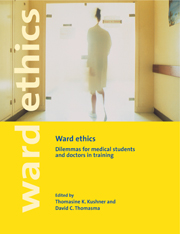Book contents
- Frontmatter
- Contents
- Acknowledgments
- List of contributors
- Prologue. Breaking the silence
- Letter from a young doctor
- Part I On caring for patients
- Section 2 Problems in truth-telling
- Section 3 Setting boundaries
- Part II On becoming a “team player”: searching for esprit de corps and conflicts of socialization
- Section 4 Abuse and mistreatment
- 12 Psychological abuse: subjected to humiliating and belittling behavior
- 13 Physical abuse: actual physical harm
- 14 Sexual abuse: sexist slurs and sexual advances
- Section 5 Argot, jargon, and questionable humor: assuming the mantle at the patient's expense
- Section 6 Making waves: questioning authority and the status quo
- Section 7 Perceiving misconduct and whistle-blowing: observing peers or superiors commit an act deemed unethical
- Epilogue: Using this book
- Glossary
- Index
14 - Sexual abuse: sexist slurs and sexual advances
Published online by Cambridge University Press: 05 February 2015
- Frontmatter
- Contents
- Acknowledgments
- List of contributors
- Prologue. Breaking the silence
- Letter from a young doctor
- Part I On caring for patients
- Section 2 Problems in truth-telling
- Section 3 Setting boundaries
- Part II On becoming a “team player”: searching for esprit de corps and conflicts of socialization
- Section 4 Abuse and mistreatment
- 12 Psychological abuse: subjected to humiliating and belittling behavior
- 13 Physical abuse: actual physical harm
- 14 Sexual abuse: sexist slurs and sexual advances
- Section 5 Argot, jargon, and questionable humor: assuming the mantle at the patient's expense
- Section 6 Making waves: questioning authority and the status quo
- Section 7 Perceiving misconduct and whistle-blowing: observing peers or superiors commit an act deemed unethical
- Epilogue: Using this book
- Glossary
- Index
Summary
CASE
“Homework”
A woman physician recalls, “When I was in training a urology resident said to me, Why don't you come home with me and I'll show you how to pass a catheter.” I answered that it wasn't necessary, I'd already done pediatrics.”
Was this sufficient? appropriate? Should I have reported the incident? If so, to whom?
CASE
“What do you like best?”
On one occasion, part of my training as a medical student involved observing and assisting a surgery. The surgeon in preparing the abdomen and pointing out that I was about to hold a retractor asked me pointedly, “Well, which do you like best 4” or 6”?” Everyone around the table snickered and I was so humiliated I couldn't say a thing. What would have been the best way to handle this situation? Try to think of a witty retort? Take the surgeon to the harassment board?
CASE
“The histology lesson”
As freshmen medical students in Italy, our first lessons were about histology. The practice was for the professor to sit next to the students and explain the slides as he inserted them in the microscope. When my turn came he readied the slide and said, “These are spermatozoa. You know how they taste, don't you?” As a young, very shy, woman from a provincial town I was stunned and humiliated. I could not raise my head to look at him or bring myself to respond.
- Type
- Chapter
- Information
- Ward EthicsDilemmas for Medical Students and Doctors in Training, pp. 148 - 152Publisher: Cambridge University PressPrint publication year: 2001

